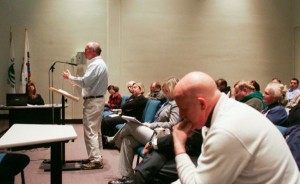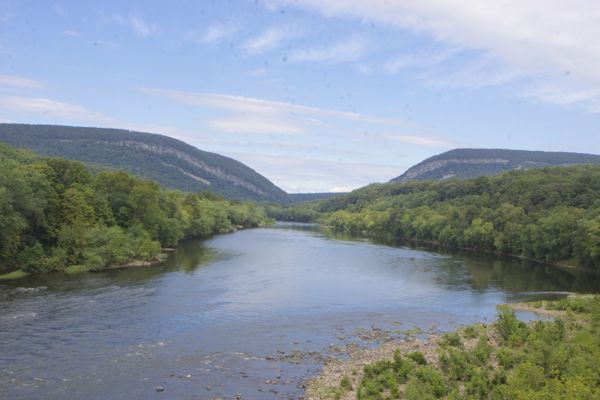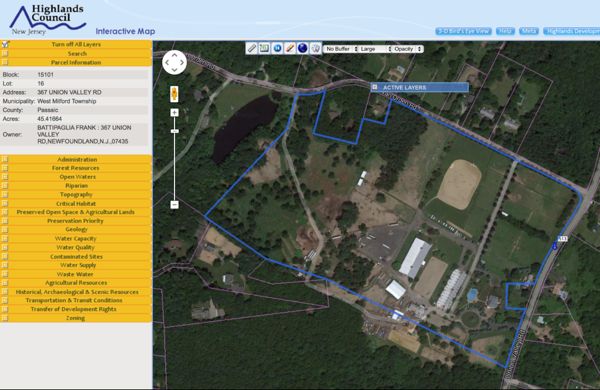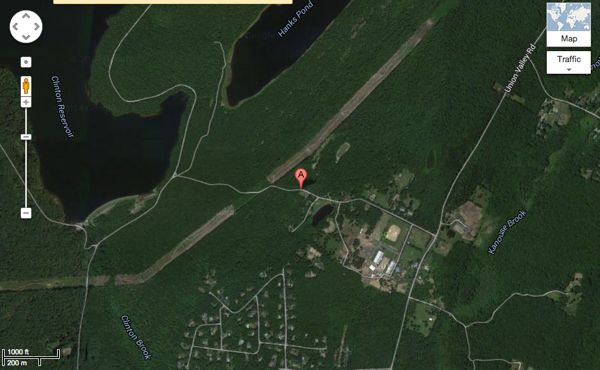Pinelands Pipeline Prognostications
[Update – 11/22/15 in text below, we review speculations in light of current reality]
I wrote about last Friday’s Pinelands Commission meeting, mostly just to describe what transpired (if you are interested in what went on at Friday’s meeting, see this).
So, today, we do some informed speculation on what might be coming down the pike:
1) Surprise Guest Suggests Another Manipulative Move
There was a surprise guest who spoke to the Commission during the public comment session to offer his time and expertise to assist the Commission’s nascent efforts to reform the MOA regulations in the CMP.
That guest was none other than Tony D. of the NJ Builders Association:
Tony DiLodovico Chosen NJBA Associate of the Fourth Quarter. Tony DiLodovico, Director of Regulatory Compliance for Omland Engineering has been named as NJBA’s Associate of the Fourth Quarter. He has been an active member of NJBA and the Shore Builders Association of Central New Jersey (SBACNJ) for over 20 years.
Tony just happens to be a friend and former colleague of Nancy Wittenberg, currently the Executive Director of the Pinelands Commission.
Wittenberg previously served as a NJBA lobbyist.
Here’s what we had to say back in 2006, when Gov. Corzine’s DEP Commissioner Lisa Jackson selected Wittenberg as Assistant Commissioner for Environmental Regulation:
BUILDERS’ LOBBYIST TAPPED AS TOP STATE ENVIRONMENTAL REGULATOR
“This appointment shows that the revolving door of business lobbyists exerting undue influence on environmental regulation will be swinging briskly,” said New Jersey PEER Director Bill Wolfe. “While professionally and academically qualified to fill the post of Assistant Commissioner, Ms. Wittenberg’s appointment is not in the public interest and sends the wrong message to the public and professional staff and scientists in the Department.” […]
“Her extreme positions and statements as a NJBA lobbyist raise legitimate questions about her judgment and capacity to fairly and objectively administer environmental laws,” Wolfe added, noting that, as Assistant Commissioner for Environmental Regulation, Wittenberg will be a member of the DEP Management Team and influence Department-wide policy, budget, staffing, and enforcement decisions.
We reiterated those concerns in 2010, when Gov. Christie appointed Wittenberg to the Pinelands Commission ED post, see: Christie Names Former Builders Lobbyist As Head of Pinelands Commission
But others were far less concerned about Ms. Wittenberg: (see 11/30/10 Asbury Park Press story by Kirk Moore):
“I think Nancy is a very knowledgeable and talented person,” said Jeff Tittel, director of the Sierra Club’s New Jersey Chapter, who describes her as a friend. But “she looks at land use very differently than environmentalists do.”
Carleton Montgomery of the Pinelands Preservation Alliance said he thinks Wittenberg can be effective at managing the Pinelands’ land-use plan that covers 22 percent of New Jersey’s land mass.
“I’m optimistic that she will turn out to be a good choice. She brings a wealth of skill and experience to the job,” Montgomery said. Wittenberg has a reputation for intelligence and savvy management that could stand her well in the new job, he added: “The Pinelands Commission is in a weakened state, and its budget has been cut to the bone.”
If nothing else, the South Jersey Gas pipeline debate absolutely proved that Ms. Wittenberg is “savvy” and “talented”.
Getting back to Tony D.

Tony D., bald guy in foreground. That’s me testifying. I think this was at a DEP hearing on new post Sandy CAFRA rules
I’ve known Tony for years and we spoke in depth during the Commission’s 30 minute executive session on Friday about the pipeline debate. I asked him why he was getting involved.
Based on that discussion, first of all, it seemed clear that he had been talking with Nancy, because while Tony agreed that the MOA process was seriously flawed, he praised Nancy and blamed Chairman Lohbauer for pulling the rug out from under her and Commissioner Lloyd for throwing a monkey wrench into the process at the last minute.
Second, putting 1 plus 1 together, after hearing Tony volunteer to serve on any Ad Hoc Committee to reform the MOA process, I strongly suspect that Nancy may have given Tony a call and asked him to come and get involved.
I suspect that the overall game plan is to not oppose Chairman Lohbauer’s proposal to form an Ad Hoc MOA rule reform Committee, but rather to install Tony on the inside, delay and co-opt the MOA reform process, and divert the focus while SJG pursues an alternate pipeline route outside the Pinelands.
[Update: The ad hoc MOA Committee is still not finished its work. There has been little opposition. So, I was half right about delay. But I was wrong about Tony D. and hopefully I can take some credit here for derailing his involvement.
I was right that SJG would pursue an alternative, but not an alternative PIPELINE ROUTE. SJG pursued an alternative REGULATORY ROUTE.]
2) Governor’s Office Monitoring
During the course of the SJG pipeline debate, the Commission was criticized as appearing to be a puppet of Gov. Christie, who strongly supported the pipeline and was exerting political pressure behind the scenes in several ways.
A key focus of the public debate was that the Commission had to protect the integrity of the CMP AND the independence of the Commission.
As I’ve written, the Pinelands Commission is an independent regulatory agency.
Under section 4 of the Pinelands Act, the Commission is legally “in but not of” the DEP, and thus independent form both the DEP and the Gov.’s Executive Branch management control.
For the purpose of complying with the provisions of Article V, Section IV, paragraph 1 of the New Jersey Constitution, the commission is hereby allocated within the Department of Environmental Protection, but, notwithstanding said allocation, the commission shall be independent of any supervision or control by such department or by the commissioner or any officer or employee thereof.
Under the Pinelands Act, the Governor has three type of powers to influence the Pinelands Commission:
a) nomination of 7 Commissioners, but that power is checked by the Senate who must confirm his nominees. And there is no question that the Executive Director serves the Commission, not the Gov. (section 5):
g. The Governor shall designate one of the members of the commission as chairman. The commission shall appoint an executive director, who shall be the chief administrative officer thereof. The executive director shall serve at the pleasure of the commission, and shall be a person qualified by training and experience to perform the duties of his office.
b) budget, but again that power is checked by the Legislature who must vote to pass the Gov.’s budget; and
c) on the CMP and overall policy, the Gov. has “negative” power, i.e. procedurally, the Gov. is provided a copy of the CMP after its adoption by the Commission. The Gov.’s effective policy power is limited to the Gov.’s power to veto the minutes to block any action by the Commission. The Gov. exercised that power to block a staff raise approved by the Commission.
But while the Gov. can block actions by the Commission, he can not direct the Commission to Act.
So, given the independence of the Commission and the Governor’s limited powers, why would the Commission allow the Gov.’s Office to attend and listen in on their confidential deliberations in executive sessions?
The Commission went into Executive Session on Friday to discuss litigation. The parties to that litigation are the Pinelands Commission and the Pinelands Preservation Alliance. Some of the legal issues involve potentially embarrassing – or even incriminating – emails involving the Governor’s Office.
The Gov.’s Office and the Pinelands Commission have potentially conflicting interests and the Gov. is NOT a party to the PPA lawsuit.
So, why would the Commission allow the Gov.’s Office to sit in on confidential Executive Session deliberations on the PPA OPRA litigation?
At a minimum, that raises a perception issue, e.g. the Commission bending to the will of the Gov.
But it also raises serious legal ethics issues. The Attorney General is representing the Pinelands Commission. The Commission is the AG’s client, not the Gov.’s office.
Just like it would be improper for the BPU or the DEP to attend Executive Sessions, it also is wrong for the Gov.’s Office to be allowed in the room.
What I think this means is that the Gov. is still pressuring the Commission – the Gov.’s attempts to replace Commissioners who defied him and voted against the SJG pipeline is one very public and obvious threat.
Whether they will fold is unclear.
But, at a minimum, the Commission should kick the King out of their Court.
3) Pipeline Around pines?
I am getting vibes that some pipeline opponents are seeking to have SJG pursue and alternate route that skirts the Pinelands and would not require Pinelands Commission review, and that they might SUPPORT such an alternative pipeline route.
That would be a very bad idea – see many of the 10 reasons to oppose the SJG pipeline.
An alternative route would be far more damaging to natural resources; as fossil infrastructure, would have the same climate change impacts of re-powering BL England plant; would undermine economic investments in renewable energy; and have the same air pollution impacts.
I really hope that my gut is wrong on this.
[Update: I was wrong about this – SJG pursued another regulatory option. Glad I was wrong and that opponents have remained unified.]
4) Military Madness loophole?
The new issue of the New Jersey Natural Gas proposed pipeline was discussed on Friday.
There were suggestions that the location on Dix/McGuire Joint Base could be used to dodge CMP restrictions.
Do I smell a military loophole being manufactured?
Something to get clarified, ASAP.
[Update: Got this one right – It seems like NJ Natural Gas did indeed concoct a false military need.]



